
PalZ
metrics 2024
Unlocking the Mysteries of Evolutionary Change
Introduction
PalZ is a prestigious academic journal in the field of Paleontology, published by Springer Heidelberg in Germany. With a long-standing history that traces back to its converged years from 1914 to 2024, this journal offers invaluable insights into the evolutionary dynamics and ecological relationships of past life forms. Holding a commendable impact factor and ranked in the Q2 category of Paleontology, it consistently showcases high-quality research that resonates within the scientific community, evidenced by its Scopus rank of #38 out of 113 in Earth and Planetary Sciences. PalZ is committed to open access, ensuring that its rich repository of scholarly articles is readily accessible for researchers, professionals, and students alike. By engaging with the journal, readers will encounter cutting-edge studies that are pivotal for advancing our understanding of paleobiology and the historical patterns of biodiversity.
Metrics 2024
 0.58
0.58 1.90
1.90 1.60
1.60 34
34Metrics History
Rank 2024
Scopus
IF (Web Of Science)
JCI (Web Of Science)
Quartile History
Similar Journals
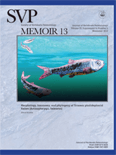
JOURNAL OF VERTEBRATE PALEONTOLOGY
Pioneering Discoveries in Vertebrate PaleontologyJOURNAL OF VERTEBRATE PALEONTOLOGY, published by Taylor & Francis Inc, is a premier academic journal dedicated to advancing the field of vertebrate paleontology. With a strong emphasis on both traditional and innovative research methods, this journal provides a platform for the dissemination of influential studies and discoveries that shape our understanding of vertebrate evolution and their ecological contexts. Operating under an ISSN of 0272-4634 and an E-ISSN of 1937-2809, it covers research published since 1981 and aims to foster a collaborative environment for researchers, professionals, and students alike. The journal is currently ranked in the Q2 category of Paleontology, standing at position #45 among 113 in its Scopus category, which underscores its significant contribution to the academic community. As a crucial resource for scholars, JOURNAL OF VERTEBRATE PALEONTOLOGY provides insights that not only enrich academic discourse but also stimulate further research and exploration in a field that bridges biology, geology, and conservation.
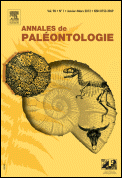
ANNALES DE PALEONTOLOGIE
Exploring Earth's History Through Innovative ResearchANNALES DE PALEONTOLOGIE is a distinguished academic journal published by MASSON EDITEUR that plays a pivotal role in the field of paleontology. With an ISSN of 0753-3969 and an E-ISSN of 1778-3666, this journal has been a vital resource since its inception in 1988, continuously contributing to the advancement of knowledge in Earth and Planetary Sciences, particularly focusing on paleontological research. Currently ranked #68 out of 113 in its category by Scopus, and celebrated for its Q2 quartile standing, ANNALES DE PALEONTOLOGIE publishes innovative studies, reviews, and discussions that appeal to a diverse audience of researchers, professionals, and students. The journal aims to foster a deeper understanding of paleontological phenomena and encourages interdisciplinary collaboration within the scientific community. Although it is not an open access journal, its commitment to scholarly excellence ensures that the content is highly regarded and widely referenced in academic circles. Situated in Issy-les-Moulineaux, France, it continues to maintain a global readership while promoting significant advancements in paleontological research.

PALAEONTOLOGIA ELECTRONICA
Innovating Paleontological Insights for a Sustainable FuturePALAEONTOLOGIA ELECTRONICA is a distinguished open-access journal published by COQUINA PRESS, offering a vital platform for the dissemination of cutting-edge research in the fields of Paleontology and Oceanography. Launched in 1998, this journal has continuously fostered scholarly communication, allowing unrestricted access to scientific findings and contributing significantly to the advancement of the field. With an impressive track record since its inception, PALAEONTOLOGIA ELECTRONICA holds a 2023 Scopus ranking of #39 out of 113 in the Paleontology category, demonstrating its value among academic resources as evidenced by its Q2 quartile ranking. The journal is based in the United States, and it encourages submissions that span a diverse range of topics, from fossil analysis to evolutionary biology. As a prominent resource for researchers, educators, and students alike, it plays a crucial role in shaping the future of paleontological study.

NAUTILUS
Advancing Aquatic Sciences for a Sustainable FutureNAUTILUS is a distinguished journal published by the Bailey-Matthews Shell Museum, dedicated to advancing the understanding of aquatic sciences as well as ecology, evolution, behavior, and systematics. With an ISSN of 0028-1344, NAUTILUS has played a significant role in the scholarly community from its inception, with publication converged between 1996 to 2015 and 2017 to 2024. Although currently categorized as Q4 in Aquatic Science and Ecology, Evolution, Behavior and Systematics for 2023, the journal has a reputation for publishing high-quality research that contributes to the broader scientific discourse. Researchers and students alike can benefit from the insights provided by NAUTILUS, which remains committed to exploring the intricate relationships within aquatic ecosystems. Its editorial management, led by Dr. José H. Leal, ensures rigorous peer review and academic excellence, making it a crucial resource for those dedicated to discovering the complexities of aquatic and ecological research.

REVISTA BRASILEIRA DE PALEONTOLOGIA
Bridging Research and Discovery in Paleontological ScienceREVISTA BRASILEIRA DE PALEONTOLOGIA (ISSN: 1519-7530, E-ISSN: 2236-1715) is a premier academic journal dedicated to the field of paleontology, published by the esteemed SOCIEDADE BRASILEIRA DE PALEONTOLOGIA. Operating under a Q3 quartile ranking in the 2023 Scopus statistics for Paleontology, this journal serves as a vital platform for researchers, professionals, and students to disseminate and engage with cutting-edge discoveries and methodologies in paleontological studies. With a broad scope that encompasses various aspects of Earth's historical life, REVISTA BRASILEIRA DE PALEONTOLOGIA provides an essential resource for the scientific community, particularly those based in Brazil and South America. The journal is committed to promoting rigorous research and fostering collaboration among scholars, ultimately contributing to advancements in the understanding of past biodiversity and extinction events. Its thoughtful curation of articles since 2010 ensures that it remains at the forefront of paleontological scholarship, despite its limited HIndex and open access options. This journal is a crucial asset for anyone looking to deepen their understanding of evolutionary processes that have shaped our planet.

STRATIGRAPHY AND GEOLOGICAL CORRELATION
Exploring the Layers of Earth’s HistorySTRATIGRAPHY AND GEOLOGICAL CORRELATION is a prominent scholarly journal published by PLEIADES PUBLISHING INC, featuring a dedicated focus on the fields of geology, stratigraphy, and paleontology. With ISSN 0869-5938 and E-ISSN 1555-6263, this journal has been disseminating significant research findings since its inception in 1994, continuously contributing to the academic discourse through 2024. Despite not currently offering open access, its relevance is underscored by its Category Quartiles for 2023, where it has established itself as Q3 in Geology and Paleontology, and Q2 in Stratigraphy. STRATIGRAPHY AND GEOLOGICAL CORRELATION ranks #29 out of 55 in Stratigraphy and #186 out of 321 in Geology according to Scopus metrics, positioning it within the competitive landscape of Earth and Planetary Sciences. Researchers, professionals, and students are invited to engage with the journal’s content to deepen their understanding and foster innovation within these critical areas of study.
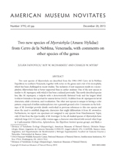
AMERICAN MUSEUM NOVITATES
Elevating Understanding: Insights from the American Museum of Natural History.AMERICAN MUSEUM NOVITATES, published by the American Museum of Natural History, stands as a prestigious platform for scholarly dissemination in the fields of Archeology, History, and Museology. With an impressive impact factor evidenced by its Q1 rankings in 2023 across these categories, this journal is a vital resource for researchers and professionals seeking to advance knowledge and understanding within these disciplines. The journal's commitment to quality research is reflected in its high rankings within Scopus, where it boasts a remarkable rank of #37 in History and #4 in Museology, showcasing its relevance and influence in the academic community. While open access options are not currently available, readers can access compelling research articles that span from its inception in 2005 to the present date, making it an essential reference for those interested in the historical and cultural implications of natural history and museum studies. Located in the heart of New York, this journal fosters a collaboration between scientists and scholars, enriching both academic and public understanding of our shared heritage.
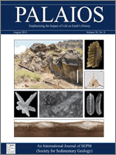
PALAIOS
Unveiling the Secrets of Past EcosystemsPALAIOS is a renowned journal published by the SEPM-Society for Sedimentary Geology, focusing on the interdisciplinary fields of paleontology and sedimentary geology. Established in 1986, this scholarly publication serves as a vital platform for disseminating innovative research and insightful reviews that bridge ecological and evolutionary aspects with paleontological studies. With an impressive track record, the journal has achieved a commendable impact factor and consistently holds a Q2 ranking in both Ecology, Evolution, Behavior and Systematics and Paleontology as of 2023. Researchers and professionals will benefit from the diverse range of studies presented, which encompass fossil analysis, stratigraphy, and the impacts of climate change on past ecosystems. By being at the forefront of research and education in these fields, PALAIOS not only enhances comprehension of historical biodiversity patterns but also informs contemporary ecological theories.
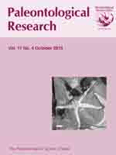
PALEONTOLOGICAL RESEARCH
Advancing Knowledge in Paleontology and Ecology.PALEONTOLOGICAL RESEARCH, published by the PALAEONTOLOGICAL SOCIETY OF JAPAN, is a prominent peer-reviewed journal that addresses key developments in the field of paleontology, ecology, and evolutionary biology. With an ISSN of 1342-8144, this journal has established itself as a vital resource for researchers and professionals who seek to explore the intricate history of life on Earth, integrating insights into evolutionary dynamics and ecological frameworks. Operating since 1997 and with content converging up to 2023, PALEONTOLOGICAL RESEARCH occupies a notable position, ranked in the second quartile within both Ecology, Evolution, Behavior and Systematics and Paleontology categories. While it is not an open-access journal, its rich repository of studies significantly contributes to the academic community. Researchers and students engaged in the exploration of ancient ecosystems and their implications for current biodiversity are sure to find valuable insights within its pages, reinforcing the journal's importance as a leading platform for disseminating paleontological knowledge in Japan and beyond.
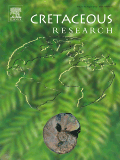
CRETACEOUS RESEARCH
Connecting Discoveries from the Cretaceous FrontierCRETACEOUS RESEARCH, published by Academic Press Ltd - Elsevier Science Ltd, is a leading journal in the field of Paleontology that has established itself as an essential resource for researchers and professionals delving into the rich tapestry of the Cretaceous period. With its ISSN 0195-6671 and E-ISSN 1095-998X, this journal boasts a prestigious placement in the academic landscape, holding a Q1 rank in the 2023 Paleontology category and proudly positioned at 21st out of 113 in the Scopus ranking, reflecting its impact factor that places it in the 81st percentile. Since its inception in 1980, CRETACEOUS RESEARCH has facilitated a deeper understanding of prehistoric life and its evolutionary processes, covering topics such as fossil discoveries, paleoecology, and biostratigraphy. This journal best serves those seeking to expand their knowledge and contribute innovative findings to the scientific discourse surrounding the Cretaceous era. As it continues to converge into the future until 2025, it remains dedicated to providing an open platform for the dissemination of high-quality research that shapes our understanding of Earth’s geological past.